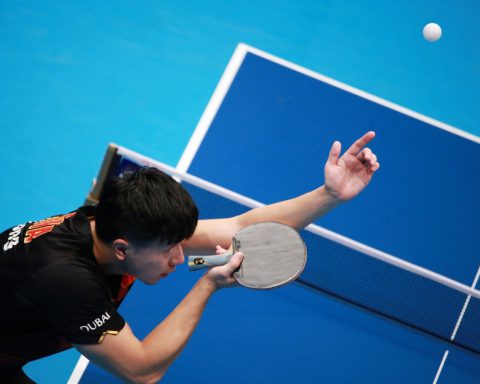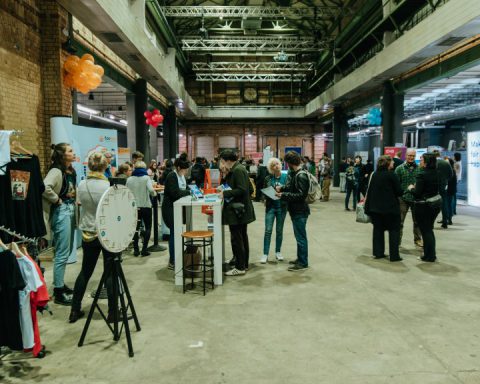It has been over an hour since the actors of UBI Theatre took their curtain call. The stage is now vacant and the audience have left, but most of the cast still remain here, clustered around the bar to the back of this small venue, and raising glasses to what has been a successful opening night for their new play, Blackmailing Butterflies. Tonight, the 10th of April, is the first of a four-night run at Die Scheune in Stötteritz.

Laura Shann, the play’s director, is pouring drinks. She is here tonight also in her capacity as programme leader and teacher of UBI’s English-speaking performance group. Her students are tonight’s stars and, since the end of the show, the polarity in the room has rearranged itself in the shape of a classroom around this woman. The excited acting cast orbiting and pitching Laura-what-did-you-think-of, and Laura-tomorrow-I-think-we-should questions.
By this point, the opening night nerves that had been visible during the performance have now completely gone from this group of mostly young adults.
They’re all buzzing like fizzy children with post-show energy, and adrenaline, and achievement, and some relief. They want to talk about the show and to review every moment and every line from every moment, obtain external confirmation that they did good where they felt that they did good, and get reassurance in where they know they could have done better. Now that the audience are no longer looking at them, the actors now look to Laura.
She appeals for calm, and holds a piece of paper aloft so that the actors can all see that written there on the paper is an email address. Die Scheune is a community hall in Stötteritz with one room and a glass door between the back row and a side street. A local man had been passing with his dog, and had been intrigued enough to come inside to watch part of the performance.
Do not confuse this level of local theatre with the bright lights of anywhere. This email address is an avatar for success. That person ended up enjoying the play so much that he sought out Laura afterwards, and asked for himself to be placed on UBI Theatre’s mailing list so that he might catch the group’s next production.
“This is it.” Laura says to her students, the actors, making a point of addressing every pair of eyes looking at her, the paper still in her hand, “You guys did this. You guys did this with what you did tonight.”
Laura Shann’s mother is also present, having flown from Inverness. Mother and daughter both wear big proud smiles.
—
You said that you were nervous.
Laura: I was. I was just really nervous for them, because I really do care for them and I want them to have a good time. They’ve worked so hard and some of them have never ever acted before, so they were really nervous… I want them to do well.
How many of the cast have acted before, and how many are new?
Laura: A mixture, really. Half and half because most of the people that come to us are students, and they come and try it out, and then they go back to their home countries. But I think most of this particular group were with us before. Those people stayed because this is their passion, and I try to keep them happy as well.
I noticed you running over to talk with them at the start of the interval. What did you tell them?
Laura: I had to run back because the curtain broke and we had to change the scene with the curtain open… which is not really something the audience should have to see. So I had to run back and say that we’re just going to have to deal with it, and that we have to really just be on the wing when things like that happen. We just have to deal with it.
And I said to them, “by the way, you’re killing it.” They did so well. They were so nervous.
At what point during the performance did you feel that the nerves subsided?
Laura: Oh, they never do. You can tell on that last song, they went a little off – but who cares, I think they all did a really, really good job tonight.
Were there any unique challenges you came up against while rehearsing Blackmailing Butterflies?
Laura: Music is always quite hard. I’ve never directed a musical before. There were only five songs, but it’s harder than you think. And comedy is always hard, because timing is imperative to humour.
That’s not something you can really teach people. You can teach acting technique and things like that but timing and comedy is a natural gift. We did a lot of work on pace. Keeping up the rhythm and the timing so that it didn’t flop.
—

I hadn’t been familiar with Blackmailing Butterflies as a story before now. It’s a light-humoured musical on the subject of mid-life crisis, penned by British indie-writer Nigel Holloway.
UBI’s advertising posters reference the Rocky Horror Picture Show-themed party scene that the play opens with, but the link between Rocky Horror and Blackmailing Butterflies is arbitrary. The play’s style is more like a Friends–era sit-com, where peak action is the intense conversation about the him or the her. The direst consequence these characters can imagine is to be without romance. To win the day, all the heroes have to do is find enough bravery in themselves to kiss their respective nemesis on the face and copulate as the credits roll.
For comparison, the previous play that this group performed was George Orwell’s depiction of totalitarian apocalypse, 1984. That change of pace, Laura says, was a deliberate one. After working on such heavy material for six months in 2017, there was a desire among this group to try a different challenge, and Blackmailing Butterflies was a fun option.
The cast members are students in the UBI Performance Group programme; and, as the story is based around the lives of a mirror fictional theatre group, there are cheeky fourth-wall asides in the dialogue that poke fun at this.

The acting cast are a mix of skill levels. Some of the more experienced heads did impress with their competency and depth, such as Emily W, who played Aggi. What made this girl particularly stand out was her physicality as well as movement, and awareness of the space around her.
She was always moving, therefore I found myself always watching her. Her theatrical expression was also on point.
In live theatre, the subtleties of regular communication can get lost when observed from the back row. Likewise, over-acting can make the front row nauseous.
With this character, Emily was able to find a really nice sweet spot.
—
How long have you been in Leipzig?
Emily: Since August 2016, a year and a half ago.
When did you get involved with UBI?
Emily: I did theatre back in the States. One of the first things I looked up was where I could do theatre when I got here. I found UBI within the first month and I’ve been doing it ever since.
How do you feel about your performance tonight?
Emily: Overall, it went well, but it definitely had some mess-ups. When I was singing in my own song, and sometimes little things like props… and running into things backstage because back there you can’t see shit. Little things that end up affecting other things and throw off the scene, skipping over certain lines. Nothing completely train wrecked but it didn’t go as well as it could have.
—
I also want to mention Sophie Swan, who played the lovelorn temptress Sharon. This girl had some demanding parts near the beginning of the show back when the audience was still cold.
She performed her solo song expertly, but to no adulation and, when the other actors around her were still tight and self-conscious with nerves, Sophie was already on and fully in-character.

Sophie really carried those early scenes and got the whole thing moving.
Others impressed in different ways. Matt Keane’s acting career is apparently just four months old. I had no idea this guy was so fresh, because he was so assured in his role as Jack. The only aspect of his performance that made me feel uncomfortable was a pair of very tight jeans.
Another example would be Guru Raja, who was introduced on the programme notes as “your regular run of the mill Indian IT guy.” However, not many IT guys are getting on stage in their spare time to play a lead male.
It’s true that I wasn’t always convinced by Guru’s portrayal of Barney. I think that his character needed more confidence. At times, something incongruous between the words Barney would be saying and the body language behind those words jarred and felt inauthentic. An ability to marry the two was what made the stronger actors stand out form the rest, but this isn’t Hollywood. The group may have made it through as a collective, but each individual had their own parameters for success.
—
Hi there. You’re Guru?
Guru: How do you know my name?
It says right here on the programme.
Guru: Ahhh.
Is there anything you plan to do differently in tomorrow’s performance?
Guru: Oh yes. Don’t mess up lines.
Why did you decide to take up acting?
Guru: I have a lot of stage fright doing presentations and stuff in my job. I think theatre is the perfect way to help this problem. Either you get over a problem or you get under it. I also have a problem with talking to a group of people at the same time, and this is something I want to get better at. Today I wasn’t looking at the audience so much, so yeah I want to get better. I’ll keep my head down until then.
—

I was interested to find that Laura Shann had written for LeipGlo way back in 2016, and had shared some of the story as to how she came to be in this position. This was in the lead up to her first show with UBI, In the Jungle, by Andrea AA Rassler.
UBI Theatre Group had been founded originally in England by the late Gareth Knapman, who had moved the company to Leipzig but died young.
Laura was the one tasked with the responsibility of filling his role as leader of the English department. Now, she and Claudia Jessat – who leads the German courses and featured tonight in an acting role as “Doris” – are the women who are responsible for UBI’s present relevancy and success.
—
Claudia: I don’t really get nervous. The only thing I’m afraid of is singing.
But you had a whole song to yourself?
Claudia: Oh God, yeah…
—
Just a few days before, your correspondent was taken to the ballet by his partner. It was my first time watching ballet. We were watching Stravinsky’s The Rite of Spring at the Leipzig Oper
Obviously The Rite of Spring was a high-budget production backed with a full orchestra, and a world away from UBI or any local theatre group’s resources. However, to strip back that performance and understand what was keeping my attention glued that day: Those ballet dancers were telling a story using only their bodies as tools – and I was investing my attention in following that story because the ballet dancers on stage were electrically lost in the moment.
Every movement flowed or snapped. The group choreography beat as one heart. That day, I watched a level of artistic detail that could only be achieved by a great love of performance and honest devotion to practice.
Now, back to Die Scheune, and to Blackmailing Butterflies, where students at a small theatre school are developing their talents and aspiring to find that level.
One thing that is clear is that each member of this UBI performance group have that love of theatre as an art form.
These are men and women who have studied the craft. Even those playing minor roles brought a baseline of professionalism that kept the play flowing and hanging together. At no point did I fear what some of these actors told me that they fear: that an individual fumble or missed cue could drag the action to a stand still. The group are collectively too well-prepared for that to be a realistic danger.
But it was that same fear of failing that stunted this opening night performance. Tight body language, and rushed jokes, mumbled lines. All these things were too common in the first half and made the story difficult to follow, initially.
That magic electricity the audience picks up on when performers are really in the zone – that was absent until the stronger and more experienced actors stepped up with big and brave performances that the whole group visibly took heart from.
By the start of the second half, they all had that confidence to just let go a little bit more, and enjoy the process, and connect with whatever deep-rooted love it is that is driving them individually, as artists, to grow. And we, their audience, responded in kind.
It was an encouraging sign that the shows later in the week could be, and would be, braver.
Cover shot: Cast members of the musical comedy Blackmailing Butterflies staged by UBI Theatre. Photo © Zoe Classen









